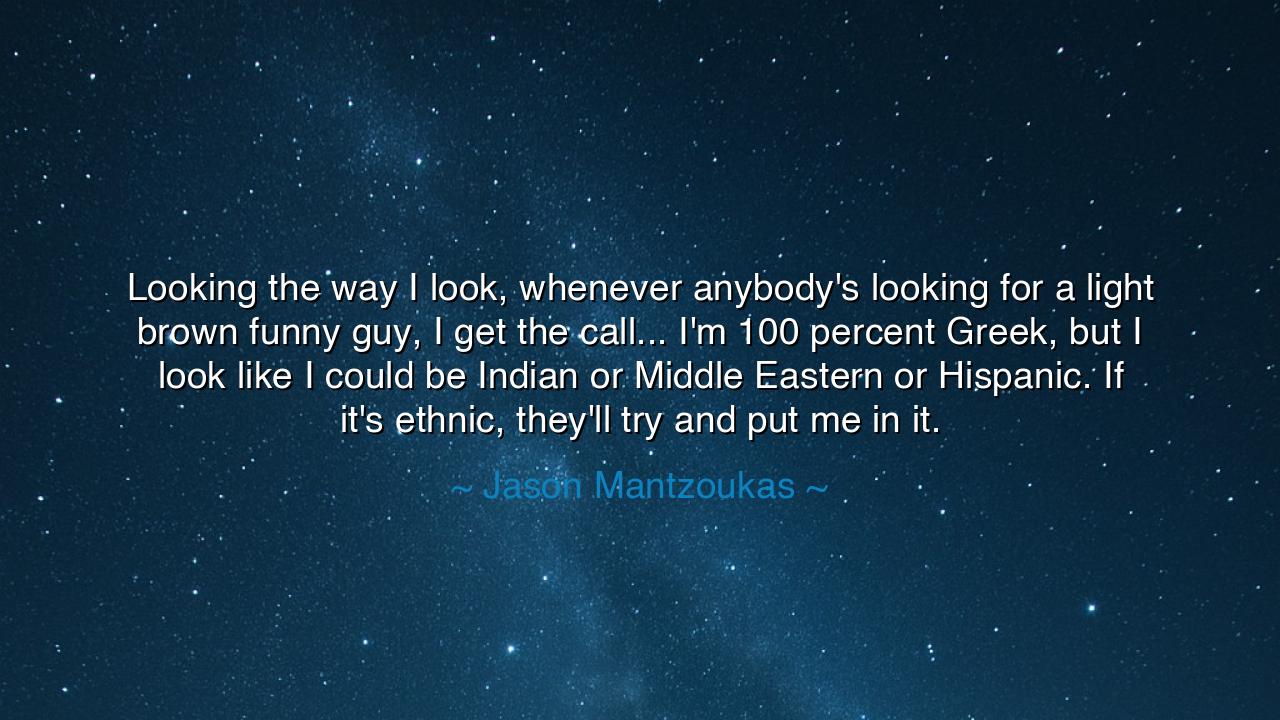
Looking the way I look, whenever anybody's looking for a light
Looking the way I look, whenever anybody's looking for a light brown funny guy, I get the call... I'm 100 percent Greek, but I look like I could be Indian or Middle Eastern or Hispanic. If it's ethnic, they'll try and put me in it.






“Looking the way I look, whenever anybody’s looking for a light brown funny guy, I get the call... I’m 100 percent Greek, but I look like I could be Indian or Middle Eastern or Hispanic. If it’s ethnic, they’ll try and put me in it.” Thus spoke Jason Mantzoukas, the actor and comedian whose words carry the laughter of truth and the weight of identity. Beneath his humor lies a story as old as civilization itself—the story of the soul confined by appearance, of the spirit misread by the eyes of others. His words, though spoken with levity, are carved from the quiet struggle of one who lives between perceptions, forever defined by how others choose to see him.
When Mantzoukas says, “Looking the way I look, I get the call,” he speaks not of opportunity alone, but of the narrowness of human imagination. In a world that hungers for easy labels, the face becomes a mask—assigned meaning before the mind within it has spoken. His lament is gentle but profound: he is seen not for who he is, but for what others assume. And yet, his tone is not bitter. There is laughter in his words, the laughter of one who has learned to transform frustration into insight. For this is the gift of the wise and the comic alike: to turn the sting of truth into the spark of understanding.
The origin of his thought lies in the long history of identity and art. In every age, the world has sought to categorize the many faces of humanity into the few boxes it can comprehend. The ancient playwright Euripides, Mantzoukas’ own Greek forebear, wrote of masks upon the stage—symbols meant to reveal character, yet they often concealed more than they showed. The actor’s mask is the oldest metaphor for this dilemma: society sees the costume and forgets the soul. So too, Mantzoukas stands as a modern actor wearing the mask the world has chosen for him, even when it bears little resemblance to the truth.
His words also reveal the burden of representation, the tension between pride and confinement. To be “the ethnic one” in an industry of images is both gift and limitation. It is the privilege of being visible, yet the pain of being typecast—trapped in the world’s narrow understanding of what “ethnic” means. In this way, Mantzoukas’ humor becomes a defense, a way to reclaim ownership of the gaze. His laughter says: You may define me by how I look, but I will define how I am seen. It is the ancient art of irony—turning the gaze of judgment back upon the beholder.
Consider the tale of Alexander the Great, another son of Greece, whose empire stretched across the lands now called India, Persia, and Egypt. In his time, he saw no borders of blood or face; he called himself a citizen of the world and sought to unite East and West. Yet after his death, others divided what he had joined, naming nations, colors, and kinds. The lesson of Mantzoukas’ reflection mirrors Alexander’s: that humanity, left to itself, prefers division to unity, and appearance to essence. But the wise refuse to be confined. They know that identity is vast, and the soul cannot be measured by the tones of the skin.
Mantzoukas’ reflection also reveals the paradox of the artist: to embody others, yet to fight to be seen as oneself. The actor must inhabit many identities, yet in the world’s eyes, he is often permitted only one. And so, his statement is not only about race or casting—it is about the eternal struggle for authenticity in a world that demands simplicity. “If it’s ethnic, they’ll try and put me in it,” he says—not to reject those roles, but to remind us that every person holds multitudes, that the visible does not define the invisible. His humor invites compassion, asking us to look beyond the surface and listen to the spirit.
So, dear listener, take heed of this wisdom wrapped in jest. Judge not by sight alone, for the eyes are easily deceived by what they expect to see. Look instead with understanding—with the curiosity that seeks the story beneath the surface. When you encounter another whose appearance you think you know, pause and ask yourself: what depth lies unseen? And when the world seeks to label you, as it did Mantzoukas, do not shrink beneath the label—laugh, as he did, and use that laughter to free yourself.
For as Jason Mantzoukas teaches, identity is not a costume, but a constellation—ever-shifting, radiant, infinite. The world may call you what it will, but the truth of who you are belongs to you alone. Wear your face proudly, not as a mask but as a map of your story. And when others see only a role, remind them—through word, through humor, through grace—that you are not a category, but a soul.






AAdministratorAdministrator
Welcome, honored guests. Please leave a comment, we will respond soon